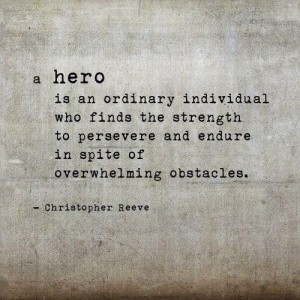Lawyer Jennifer Alvey writes, “I’d be willing to bet more than 80% of you live with a Happy Horizon in your head. The Happy Horizon is the fantasy you use to convince yourself that all your angst over your job is just a temporary blip, rather than the actual contours of your daily existence.” Read her Blog
The Happy Horizon Keeps Unhappy Lawyers Stuck
How People Become Resilient
Maria Konnilova writes in The New Yorker magazine, “Resilience presents a challenge for psychologists. Whether you can be said to have it or not largely depends not on any particular psychological test but on the way your life unfolds. If you are lucky enough to never experience any sort of adversity, we won’t know how resilient you are. It’s only when you’re faced with obstacles, stress, and other environmental threats that resilience, or the lack of it, emerges: Do you succumb or do you surmount?” Read her Article
3 Lies Lawyers Should Stop Telling Themselves
Lawyer and author of the new book, “The Anxious Lawyer: An Eight-week Guide to a Happier, Saner Law Practice Using Mindfulness,” Jenna Cho writes that lawyers tell themselves three big lies: that they aren’t good enough, that more is better and that they must sacrifice themselves and their well-being for others. Read her Blog
Time to Talk, Depressed Lawyers. To Yourself
Jennifer Alvey writes, “Depression for lawyers is not solely due to external influences or chemical imbalances. A notable chunk of it also stems from our self-talk. Lawyers, as I’ve written about before, tend to be a pessimistic lot. Let your worst-case scenario work filter become your life filter, and you’ve got an inner life that leads straight to a lot of hopelessness. Living the ‘always look on the dark side’ kind of life means that you won’t see possibilities.” Read her Blog
Meditation, Aerobic Exercise Combo Cuts Depression by 40 Percent
A new study has found that following two sessions combining meditation and aerobic exercise per week for two months can reduce the symptoms of depression by 40 percent. Read the News
How to Break that Vicious Cycle of Anxiety We Lawyers Suffer From
Casey Berman writes, “Now, we can’t blame the practice of law in general for every not-so-good emotion and thought we have, but it is safe to say that many of us lawyers who yearn to leave law behind suffer from a great deal of anxiety that is directly caused by our jobs. For many of us lawyers, our default position is to be stressed.” Read his Blog
The Legal Profession’s Drinking Problem
CNN reports the findings of a new study which found that approximately 15,000 currently employed attorneys reveals that between 21% and 36% drink at levels consistent with an alcohol use disorder. For comparison, those numbers are roughly 3-5 times higher than the government estimates for alcohol use disorders in the general population. The study also uncovered similarly alarming rates of depression and anxiety, while further identifying why it is that most lawyers don’t seek help: a pervasive fear of harming their reputation. Read the News
Depression Defies Rationality: Sad on a Sunny Day
Kerri K. Morris writes in the Chicago Tribune, “A few months ago, I told a friend at work that I struggle with depression. She was surprised and said, ‘How can you be depressed with your job and your family? You don’t have any problems.’ I swallowed hard. But, then I stopped and realized, I’m not depressed because of these things. It’s not cause and effect. It’s depression, and depression defies rationality. It doesn’t follow the laws of physics or of logic. Read her Blog
Could the Next Treatment for Depression Be Virtual Reality Therapy?
Sometimes, your best therapist is yourself—or at least a CGI avatar of yourself. A new study published by the Royal College of Psychiatrists found that virtual reality (VR) therapy can serve as a possible solution for treating depressed patients by encouraging self-appraisal and compassion. Read the News
Hope Counts: Rising Up from Depression
Depression corrodes our sense of hope.
Elizabeth Wurtzel, in her her best-selling book Prozac Nation, wrote:
“That’s the thing about depression: A human being can survive almost anything, as long as she sees the end in sight. But depression is so insidious, and it compounds daily, that it’s impossible to ever see the end.”
We can’t imagine a future without depression. When we’re in the thick of its slimy grasp, our deadened and bleak state seems to go on and on and on. Days become more about survival and meeting our most basic obligations. And nothing more because we don’t have anything left to give. Our life becomes smaller. We’re treading water because there doesn’t seem an end in sight. We’re hit by the stun gun of depression.
Our most urgent hope is . . . the absence of depression.
But the absence of pain isn’t the presence of joy and all that makes life worth living. As Richard O’Connor, Ph.D. wrote in his book Undoing Depression:
“We confuse depression, sadness, and grief. However, the opposite of depression is not happiness, but vitality – the ability to experience the full range of emotions, including happiness, excitement, sadness, and grief. It’s not sadness or grief, it’s an illness.”
Amanda Knapp writes eloquently of her own experience:
“Depression, for me, is a miles deep crater that I believe I will never crawl out of. It’s disillusionment born of an unfulfilled longing for peace. It’s fear that hope will raise me up just to drop me even further down. It’s a cocoon of despair snuggled all around me doing its best to keep me from breaking when the inevitable fall comes. The irony in all of that is that it precludes me from living and dreaming and hoping and praying. But I hold on to it so strongly at times, as if my life depends on it. Because sometimes it feels like it does. But I sit here today, decently removed from the worst of those moments of despair, and I feel myself longing for hope.”
It’s critical that we deliberately nurture a hope better than just relief from our melancholy. We need to rise up out of the dust of our suffering. It’s not enough to exist. Our existence must matter. Living a life with meaning and purpose give us hope because it brings out the best in us – even with depression. And it’s a heroic journey.
I once wrote:
“In my view, folks with depression are not so much hapless, as they are heroes.What’s a hero after all? Someone who has a great challenge to confront? Check. Someone who must confront great adversity? Check. Someone who must get up every day and do battle with a formidable foe? Check. You see, for those of you who are struggling with depression right now, YOU ARE THAT PERSON. You’re the person who has to get up every day and cope with your depression. Others can help and support you, but it’s ultimately your walk to walk. And what a courageous walk it is; every single step of it.
Some of the best people that I’ve been privileged to know struggle with depression. While they don’t have shiny medals pinned on their lapels, there is an unmistakable strength in them – even if they don’t see it. I know it’s real because I see and feel it – just like when I am in a grove of giant and majestic pines during a walk in the forest.”
Dr. Anthony Scioli, author of Hope in the Age of Anxiety, writes that one of the things needed to build up our hope muscles is faith and a spiritual foundation (whether it be in God, nature or a higher power) to experience a more open attitude for developing faith in others as well as the universe.
Pope John Paul II once said,
“Do not abandon yourself to despair. We are the Easter people and hallelujah is our hope.”
So, nourish hope in your heart. Surround yourself with hopeful people, places and books.
And resolve to be hopeful.
Copyright, 2016 by Daniel T. Lukasik
Built by Staple Creative










